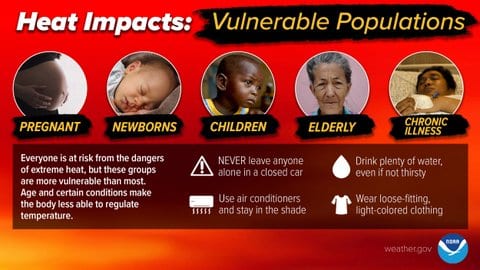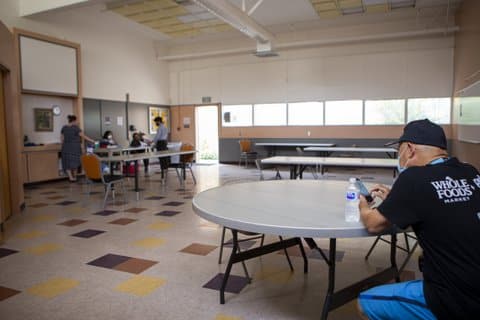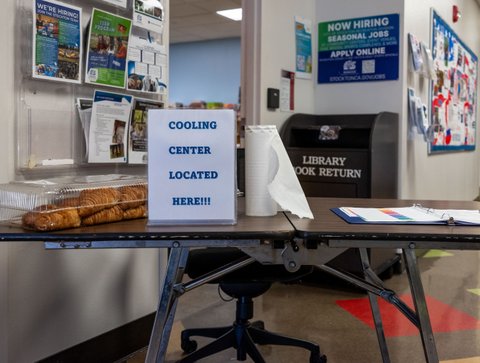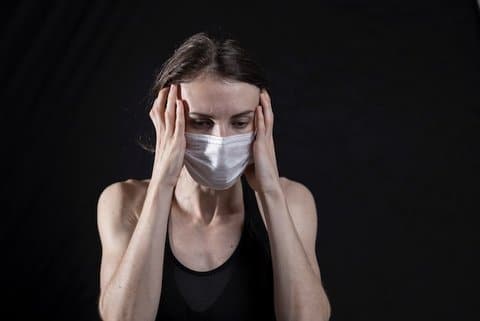
16 Jul New Campaign Launched to Protect Communities Against Extreme Heat

(National Weather Service via Bay City News)
By Bay City News
California on Tuesday launched “Heat Ready CA,” a new campaign to help protect communities from extreme heat as heat waves get more severe and frequent.
The campaign’s website, available in English, Spanish and soon expected in 10 Asian languages, provides resources to prepare a personalized plan to protect individuals and vulnerable family members, find the nearest cooling centers, and will soon help identify warning signs of heat-related illnesses. It will also provide tools to assess risk for heat-sensitive groups.
Announced by Gov. Gavin Newsom, the campaign is one of the nation’s first statewide multi-ethnic awareness and education campaigns to tackle extreme heat, according to a statement from the governor’s office.
California, among other southwestern states, is predicted to experience one of the worst heat waves in history in terms of severity and longevity.
Excessive heat watches and warnings are in effect across the southern half of the state, with additional watches, warnings, and advisories possible farther north, including the San Joaquin Valley.
“The impacts of climate change have never been more clear — the hots continue to get hotter in our state and across the West putting millions of Californians at risk,” Newsom said in a statement. “California is launching Heat Ready CA as another tool in the state’s arsenal to protect people from extreme heat. We’re asking everyone to stay alert to changing weather and take the necessary steps to keep themselves and their families safer from deadly heatwaves.”
Heat Ready CA is a two-year, $20 million campaign focusing on groups at highest risk from heat including those 65 years of age or older, workers, individuals experiencing homeless, with chronic illness, disabilities, or who are pregnant, among others. It is part of Newsom’s Extreme Heat Action Plan — a state action plan to build community resilience — guiding the state’s response to heatwaves, protecting frontline workers and helping communities set up cooling centers.
“Heat-related illnesses such as dehydration, heat exhaustion and heat stroke, as well as respiratory problems, are among the potentially dangerous effects of extreme heat,” said Dr. Mark Ghaly, secretary for the California Health and Human Services. “But as with earthquakes, floods or other natural weather events, Californians can better protect themselves and others with a few simple tips.”
The tips include:
-Stay cool: Avoid being outside in the direct heat for a long time. Try to stay in air-conditioned spaces, at home with the thermostat set between 75-80 degrees, or at a local library, shopping mall, or community center. If staying home, keep blinds closed and wear loose, light-colored, lightweight clothing. People are discouraged from taking a swim as many California rivers are running faster, while lakes are deeper and colder than they’ve been in recent years.
-Stay hydrated: People should drink at least two cups of water every hour even if they’re not feeling thirsty, and should avoid alcoholic or caffeinated drinks.
-Look after each other: Check in on friends and family, especially elderly relatives or neighbors. Call 911 if there are signs of high fever (103 degrees or higher) or in case of other emergencies.
The campaign will use a culturally responsive approach with outreach, advertising, influencers and social media engagement, the statement said. More than 100 community-based organizations will be doing outreach in every California county in over 30 languages.
Copyright © 2023 Bay City News, Inc. All rights reserved. Republication, rebroadcast or redistribution without the express written consent of Bay City News, Inc. is prohibited. Bay City News is a 24/7 news service covering the greater Bay Area.






No Comments